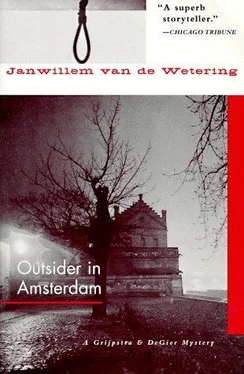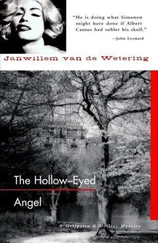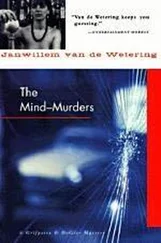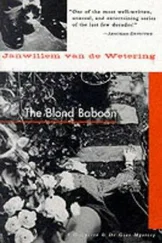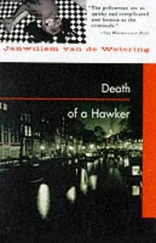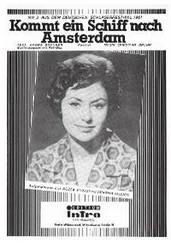Janwillem De Wetering - Outsider in Amsterdam
Здесь есть возможность читать онлайн «Janwillem De Wetering - Outsider in Amsterdam» весь текст электронной книги совершенно бесплатно (целиком полную версию без сокращений). В некоторых случаях можно слушать аудио, скачать через торрент в формате fb2 и присутствует краткое содержание. Жанр: Полицейский детектив, на английском языке. Описание произведения, (предисловие) а так же отзывы посетителей доступны на портале библиотеки ЛибКат.
- Название:Outsider in Amsterdam
- Автор:
- Жанр:
- Год:неизвестен
- ISBN:нет данных
- Рейтинг книги:4 / 5. Голосов: 1
-
Избранное:Добавить в избранное
- Отзывы:
-
Ваша оценка:
- 80
- 1
- 2
- 3
- 4
- 5
Outsider in Amsterdam: краткое содержание, описание и аннотация
Предлагаем к чтению аннотацию, описание, краткое содержание или предисловие (зависит от того, что написал сам автор книги «Outsider in Amsterdam»). Если вы не нашли необходимую информацию о книге — напишите в комментариях, мы постараемся отыскать её.
Outsider in Amsterdam — читать онлайн бесплатно полную книгу (весь текст) целиком
Ниже представлен текст книги, разбитый по страницам. Система сохранения места последней прочитанной страницы, позволяет с удобством читать онлайн бесплатно книгу «Outsider in Amsterdam», без необходимости каждый раз заново искать на чём Вы остановились. Поставьте закладку, и сможете в любой момент перейти на страницу, на которой закончили чтение.
Интервал:
Закладка:
"Well?" Grijpstra asked.
"Bah," said de Gier.
Grijpstra looked up. "I thought you liked Chinese food."
"I do," de Gier said, "but I was thinking. And I haven't come up with any good theory. The best one I have heard so far is the chief inspector's. We shouldn't think of murder straight off. Murders are rare in Amsterdam. It was suicide. A lot of the facts we have fit in, and the fact I like most is that he looked so neat."
"Ah yes," Grijpstra said. "I know what you mean. The Japanese suicide, wasn't it. You wash up and tidy yourself before you do it. You think he may have meditated a while in front of the little altar in his room, where we found traces of burnt incense?"
"Yes," said de Gier, studying the menu. "He may have been depressed for some time but he still needed a last push, and the girl throwing the dictionary at him set him off."
"And the money?" Grijpstra asked. "The seventy-five red backs. Where are they?"
"Blackmail. Or somebody stole it before he committed suicide. Another reason to do it. Or, but perhaps that's too far-fetched, he destroyed the money to put suspicion on somebody else, somebody we would suspect of having murdered him."
"Brr," Grijpstra said, "no. Let's not be too subtle."
"It could be, couldn't it?"
"No," Grijpstra said.
"Let's eat then."
De Gier had been given his beer and was blowing into the froth.
"Maybe you are right. I can't see him destroying money. Like putting it into one of these gray plastic rubbish bags we have nowadays and giving it to the garbage man. Nobody ever opens those bags. But Piet wouldn't destroy money. He liked money."
"But he may have been blackmailed."
"Severy-five thousand is a lot of blackmail. What had he done? What can anyone do in Holland nowadays that he could be blackmailed for? Even murder will give you no more than a few years in jail."
"Ha," Grijpstra said. "Weren't you telling me the other day that even twenty-four hours in jail is more punishment than any man should take?"
"True, true," de Gier said. "Forget it. Let's eat."
They ordered and de Gier started eating the moment the waiter placed the food on the table. He tore the fried meat off the thin sticks with his teeth, broke a piece of shrimp-crackers and grabbed the noodles, all at the same time.
"Easy," Grijpstra said. "You are sharing this meal with me.
"You are right," de Gier said with his mouth full.
"Easy is the word. We shouldn't rush so much. This case will solve itself, all we have to do is sit around and watch it. That's what the chief inspector told me this…"
Grijpstra didn't finish his sentence and de Gier looked up.
"What now?" de Gier asked.
Grijpstra's face had frozen.
"Look behind you," he said.
De Gier looked around and froze as well.
"Shit," de Gier said, and jumped. Grijpstra jumped at the same time. They both pulled out their pistols and they were both running toward the door but de Gier got there first. Grijpstra had run into the waiter, and the waiter and his tray were still falling when Grijpstra got into the street and saw de Gier running after their victim, a tall thin Chinese by the name of Lee Fong.
Poor Lee Fong was having very bad luck that day, the culmination of a lot of bad luck that he had had to put up with during his short stay in Holland. Ever since he had deserted his ship he had nothing but misadventure. He had lost at gambling and been arrested for pushing drugs. He had wounded a guard while escaping from jail. He had quarreled with the acquaintances who had hid him. This was the day he would leave the country. He should have stayed in hiding until the last minute but he had risked a short walk in order to buy a last good meal. And now he had run into two plainclothes policemen.
He shouldn't have hesitated when Grijpstra looked at him. There are a lot of photographs policemen have to remember and Chinese look very much alike to a Dutchman. But he had hesitated and touched his knife, a long nasty blade that he kept in a special pocket in his jeans. That one movement had caused Grijpstra to act. And now Lee Fong had de Gier after him and de Gier was gaining.
Lee took a corner and found himself in an alley, called the Ramskooi. The Ramskooi is a cul de sac. Lee thought he had no choice. He stopped, turned and pulled out his knife. De Gier stopped too and kicked. A good kick from a long leg will remove any knife. De Gier had learned at least three grips to disarm a knife fighter but they were all complicated, consisting of several movements. And he would have had to drop his pistol. He preferred holding on to the pistol. Lee Fong put up his hands as Grijpstra came panting.
The Ramskooi is a short alley and there are three bars in it. The bars' occupants were spilling into the street.
De Gier handcuffed Lee Fong and the crowd stared, and muttered. Grijpstra entered the first bar and telephoned the central radio room. Within seconds a siren began to whine. Within two minutes a white VW turned into the alley. Within three minutes it had left again, carrying de Gier and Lee Fong. The crowd was still muttering and Grijpstra dabbed at his forehead with a large dirty handkerchief. The crowd stopped muttering and returned to the bars and the next flood of beer.
"Sir," a small voice said.
Grijpstra, on his way to the restaurant, looked down. A seven-year-old boy was walking next to him. A Negro boy, very black.
"Yes, friend?" Grijpstra said.
The boy grinned, flashing large, white teeth.
"Are you a policeman, sir?"
"I am," Grijpstra said pleasantly.
"Can I see your gun please?"
"Guns are not for showing," Grijpstra said.
"No," the boy said smiling, "they are for shooting."
"You are wrong there, you know. Guns are for keeping in leather holsters, here." Grijpstra patted the holster under his jacket.
"What had the man done, sir?"
"Fighting," Grijpstra said. "He is a bad man. He fought with a knife and he hurt somebody."
"I fight too," the boy said.
"With a knife?"
"No sir. With my hands." The boy showed his small fists. "But my brother fights with a bicycle chain. He says he will teach me. It's very difficult, he says."
Grijpstra stopped and faced the boy.
"My name is Uncle Hans," Grijpstra said. "Now you go and tell your brother that he shouldn't fight with a bicycle chain. It isn't difficult and it it isn't nice. If he wants to fight he should learn judo. You know what that is? Judo?"
"Yes sir," the boy said. "I have seen it on the TV. And my teacher at school is a judo fighter. He has a brown belt but he wants a black belt. He practices all the time."
"That's good," Grijpstra said. "Maybe you can learn from him. You know what judo fighters do before they start fighting?"
The boy thought, then he smiled.
"Yes, sir, I know. They bow to each other."
"You know why they do that?"
The boy thought again, a little longer this time. "They like each other? They've got nothing against each other?"
"Right," Grijpstra said. "Run along now."
"Goodbye, Uncle Hans," the boy said.
A minute later Grijpstra found himself cursing. The curses, strung together shaping an eight syllable malediction of some force, mildly surprised him. He had stopped in front of a small display window, part of a shop halfway between the dead end alley and the Chinese restaurant. He wondered what might have caused this sudden burst of harsh and indecent verbal violence. The objects in the small shop window? He identified the objects: three sets of dentures on a shelf, guarded by a fat cat, asleep and heavily motionless on a second shelf, placed above the first. But he knew that the unexpected appearance of false teeth would be unable to upset him. He owned a set of false teeth himself and the daily early-morning sight of them grinning from the waterglass on his washstand had never yet unnerved him, on the contrary, he thought his teeth to be both handsome and useful. The cat perhaps? But Grijpstra liked cats, even if he wouldn't admit the fact to boastful and sentimental cat-keepers like de Gier.
Читать дальшеИнтервал:
Закладка:
Похожие книги на «Outsider in Amsterdam»
Представляем Вашему вниманию похожие книги на «Outsider in Amsterdam» списком для выбора. Мы отобрали схожую по названию и смыслу литературу в надежде предоставить читателям больше вариантов отыскать новые, интересные, ещё непрочитанные произведения.
Обсуждение, отзывы о книге «Outsider in Amsterdam» и просто собственные мнения читателей. Оставьте ваши комментарии, напишите, что Вы думаете о произведении, его смысле или главных героях. Укажите что конкретно понравилось, а что нет, и почему Вы так считаете.
